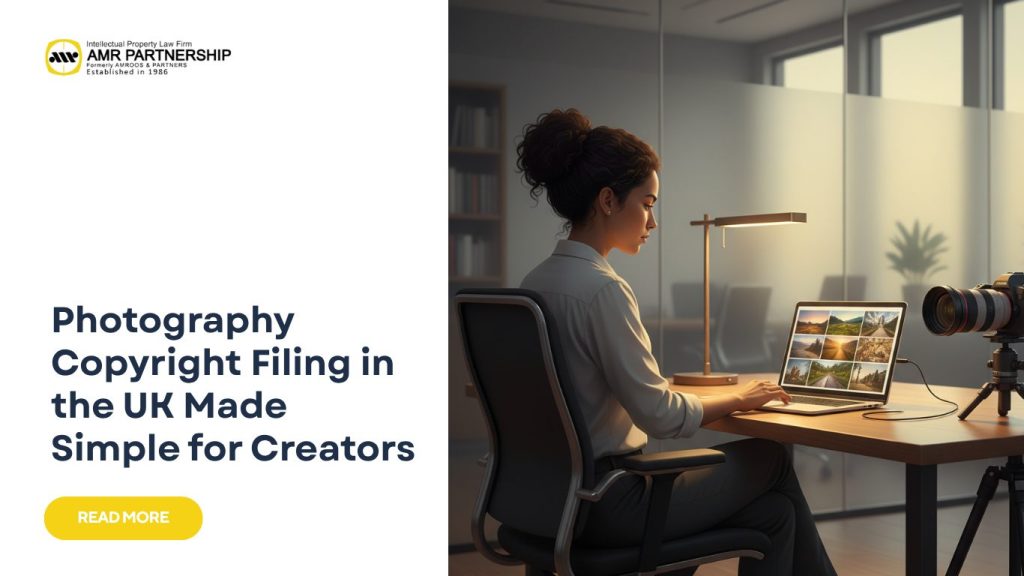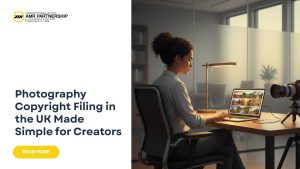
In today’s digital era, sharing and repurposing photos online has become second nature. Yet, many creators and businesses remain unaware that using, editing, or reposting a photo without permission can lead to serious legal consequences. Understanding photography copyright filing is crucial for anyone working with visual content—from professional photographers to marketing agencies and e-commerce brands. For those seeking legal clarity, expert consultation from amr.co.id can help ensure your creative assets are fully protected.
Copyright filing is not just a bureaucratic step; it’s your safeguard in a world where visuals circulate globally in seconds. Especially in the United Kingdom (UK), the law offers automatic protection for photos and digital images the moment they are created—no paperwork required. Still, registering or formally documenting your work provides stronger proof of ownership should disputes arise.
READ MORE : Why Originality Matters in Software Copyright Protection?
Photography Copyright Filing in the UK – Why It Matters
The UK’s approach to intellectual property is designed to balance creative freedom with fair protection. Whether you’re a freelance photographer, content creator, or business, knowing your rights helps prevent misuse of your photos online. Many professionals mistakenly believe they need to “file” every photo to gain protection—but under UK copyright law, protection is automatic upon creation. However, a copyright filing or registration serves as strong evidence if you ever need to enforce your rights.
In a time where content spreads instantly through social media, blogs, and AI tools, the value of a single image can be significant. Filing your copyright helps you prove authorship, assign licensing rights, and even monetize your portfolio safely. Legal experts often advise creators to maintain dated records or registration of their works for stronger legal standing in case of infringement.
READ MORE : Mobile App Copyright Registration Made Easy in Indonesia
What Photography Copyright Actually Protects
Under UK law, photographs are classified as artistic works, protected automatically by the Copyright, Designs and Patents Act 1988 (CDPA). This means every photo you take—whether shot with a DSLR or smartphone—is automatically copyrighted. The UK Intellectual Property Office (IPO) clarifies that digital images and photographs are automatically protected once created, without the need for a copyright symbol.
Photography copyright protects:
- The composition and framing of your photo
- Lighting and creative direction
- Post-processing or editing style
- The unique perspective captured by the creator
However, copyright does not protect ideas or concepts behind an image. For example, photographing a sunset is not unique, but your specific photo of that sunset—the angle, color tone, and technique—is.
Understanding this boundary helps prevent unnecessary disputes between photographers, clients, and agencies. It also ensures that credit and financial rights go to the rightful creator.
READ MORE : Creative Work Copyright Registration Lessons from Agnez Mo Case
Who Really Owns the Copyright – Photographer or Employer?
Ownership of photography rights often depends on the working relationship between creator and commissioner. Here’s how it generally applies under UK law:
- Freelance or independent photographer is usually the copyright owner unless stated otherwise in a written agreement.
- Employee photographer generally grants ownership to the employer when the photos are created as part of regular duties.
- Collaborative projects may involve shared ownership when multiple contributors play significant roles in the creative process.
For example, a freelance wedding photographer retains copyright to all images unless the client specifically purchases full rights in writing. Conversely, a corporate marketing team producing product photos for their company automatically grants ownership to the employer.
Because copyright ownership affects licensing and usage rights, legal advisors recommend using clear agreements that outline who owns the images and how they can be used.
READ MORE : Protect Your Website Smartly with Copyright Protection Services
How Long Does Copyright Protection Last in the UK
Copyright duration in the UK is relatively generous. For photographs, protection typically lasts for the life of the creator plus 70 years after their death. This ensures that the creator’s estate continues to benefit from the work long after its creation.
To illustrate, if a photographer captured a landscape in 1980 and passed away in 1990, that photo remains protected until 2060. During this period, any reproduction, sale, or publication of the image requires proper permission or licensing.
The longevity of copyright protection emphasizes the importance of documenting your creative work. Keeping records, contracts, and metadata helps ensure your rights (or your family’s) remain enforceable even decades later.
READ MORE : How Can You Protect Intellectual Property Without a Patent? Practical Strategies for Creators
Can Digitised Old Photos Have New Copyright?
A common question arises: if someone digitizes an old photo, do they gain new copyright protection? The UK IPO provides clear guidance—faithful reproductions of public domain images do not create new copyrights. However, if the reproduction involves creative enhancements, such as digital restoration, colorization, or artistic editing, those new elements can be protected.
For instance, if a museum scans a historic photo without adding creative modifications, that digital copy remains in the public domain. But if an artist restores the image with modern techniques, that restored version may qualify for new copyright.
Understanding this distinction is vital for digital archives, museums, and creative professionals who use historical images in their projects.
READ MORE : What Are the Forms of Intellectual Property You Should Know About in 2025?
When You Can Use a Photo Without Permission
While copyright law is strict, there are permitted acts and exceptions that allow limited use of protected images. In the UK, you can use photos without explicit permission under certain conditions:
- Expired Copyright means the photo is no longer protected and can be used freely.
- Private Study or Research applies when the image is used for personal learning or academic work.
- Creative Commons Licenses allow others to use photos freely as long as proper credit is given.
- Parody, Review, or Commentary covers limited use for critique, educational purposes, or artistic reinterpretation.
Always verify the license terms before using any image. Many photographers use Creative Commons licenses to specify usage rules—some allow commercial use, others do not. When uncertain, consult legal professionals to avoid accidental infringement.
READ MORE : WIPO and BRIN Joint Efforts to Enhance Intellectual Property Protection for Scientific Research
The Risks of Using Photos from the Internet
Downloading and reposting images found on Google or social media may seem harmless, but it can quickly turn into a legal issue. According to UK IPO guidelines, unauthorized use of copyrighted photos counts as infringement, even if done unintentionally.
Possible legal consequences include:
- Payment of damages or license fees
- Mandatory removal of all infringing images
- Public or reputational harm to your business
A single photo on your website or campaign could cost more than your camera if used without permission. Many small businesses have faced penalties for using stock images without proper licensing. The solution is simple: verify sources and, if possible, register your ownership to establish clear legal proof.
READ MORE : Intellectual Property Protection Indonesia: Copyright Protection in Photography and Visual Content
What to Do If Someone Uses Your Photo Without Permission
If your work is copied or posted online without credit, don’t panic. Here’s a professional way to handle it:
- Contact the infringer by reaching out politely to ask for removal or proper attribution.
- Document everything by saving screenshots, URLs, and timestamps as valid proof.
- Attempt mediation since many cases can be resolved through direct communication or negotiation.
- Take legal action if the issue continues by consulting an intellectual property lawyer who can file a claim and help recover losses.
For professional assistance, firms like AMR Partnership specialize in intellectual property rights, including photography copyright filing and enforcement in the UK.
READ MORE : What Is the Difference Between Copyright and Intellectual Property? Explained Simply
Commissioned Works and Social Media Uploads
When photos are commissioned—for example, a wedding or product shoot—ownership depends on the written agreement. In most cases, the photographer retains copyright, while the client receives limited usage rights. To transfer full ownership, both parties must sign a written assignment.
Social media presents another gray area. Many platforms include clauses granting them limited rights to use uploaded content for promotion or functionality. That’s why reading terms and conditions before uploading is essential. Once posted, removing content may not fully revoke platform rights.
For professionals managing brand visuals, legal consultation can clarify how to license, watermark, and distribute content safely without losing control of intellectual property.
READ MORE : How Does Copyright Work? A Step-by-Step Guide for Content Creators
Respect the Creator, Protect Your Work
Understanding photography copyright filing empowers creators and businesses to operate safely in a global digital ecosystem. Whether you shoot for passion or profit, knowing how UK law protects your work helps maintain both creativity and compliance. Registering, documenting, or formally consulting IP professionals ensures your images stay legally yours.
For those seeking tailored advice, legal professionals at amr.co.id provide consultation for copyright filing, licensing, and infringement resolution—complete with practical guidance and transparent pricing options. You can contact their team directly via WhatsApp or Instagram for personalized assistance. Pricing is competitive, starting from a consultation-based package depending on case complexity.
Whether you’re a creator or a business using digital visuals, understanding how photography copyright filing works—especially in countries like the UK—helps you stay creative, compliant, and confident.
- Phone (Hunting): +62-21-29036668
- Fax: +62-21-29036672 to 75
- WhatsApp Customer Service: Click here to chat
- Instagram: @amrpartnership
- TikTok: @amr.partnership
- Facebook: Law Firm AMR Partnership
- Official Website: www.amr.co.id






